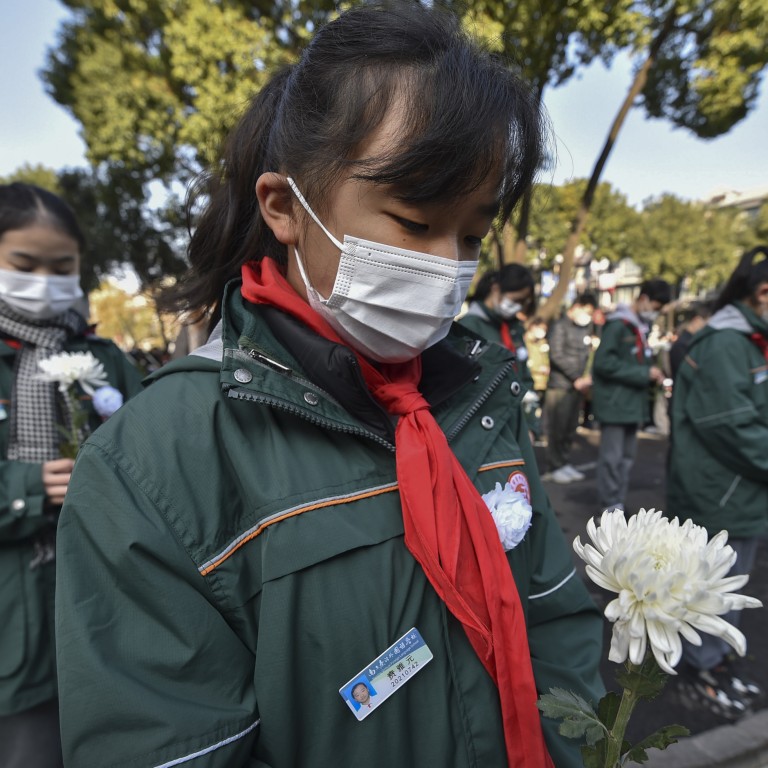
Letters | Rather than Nanking massacre, teach the best of Chinese culture to strengthen national identity
- Readers comment on the use of graphic footage as teaching material for children, a pandemic Christmas, public access to the Deep Water Bay golf course, and ways to improve medical appointment apps
To foster a sense of national identity among students, teaching them history is a must. But, unequivocally, how it was taught in this case is problematic. Indeed, parents, teachers and the children themselves have expressed distress at the graphic scenes of the massacre.
The video shown recently to some junior primary school pupils was just too violent to be suitable teaching material. It is also nonsense that watching a video that features brutal killings would help strengthen national identity.
In this case, the teachers became scapegoats. The Education Bureau, which had supplied the video and other teaching materials to the schools, said teachers had to use their professional judgment to decide whether and how to use these materials. In my view, it is the bureau that should review the materials first before sending them out to the schools.
Learning our history is not the only way to strengthen young people’s sense of national identity. Workshops on traditional culture and encouraging students to read Chinese literature would help strengthen national identity gradually.
Getting someone interested in culture is always the simpler way, rather than focusing on violent, dark episodes of history.
Michelle Pang, Tuen Mun
Asking Santa to mask up is such a killjoy
Children look forward to Christmas and meeting the Santa Claus they have seen on Christmas cards.
With this in mind, a serious question should be asked: given all the Covid-19 restrictions, does this mean that the Santas we have been used to seeing in shopping malls and hotels will be required to wear masks? Isn’t this pretty much a case of the Grinch stealing Christmas?
And what about all those young carollers who practise for months to bring joy to their audiences by singing their little hearts out? Must they, too, wear masks and struggle to make themselves heard?
When will common sense prevail?
Hans Ebert, Wan Chai
Are visiting golfers still welcome at Deep Water Bay?
Hong Kong has only six golf clubs and one of them, the Hong Kong Golf Club, has a nine-hole course at Deep Water Bay, on the south side of Hong Kong Island.
Before the pandemic, visitors could walk in and tee off from 9am to 2pm on weekdays after the club’s members finished their early games. However, the good times did not last.
The golf club has changed its rules. Visitors can no longer play from 9am onwards but have to fight for the three noon slots allocated to them on weekdays.
Recently, my wife and I arrived at the Deep Water Bay course at 10.30am hoping to take some breakfast before our noon tee-off. Unexpectedly, we were told no food and beverages would be served until after we finished play. That day we had no choice but to take a bus to Repulse Bay to have our late breakfast.
I wonder how much hassle serving these few visitors would cause the Deep Water Bay coffee shop. I just got the feeling that visitors are not very welcome any more at this nine-hole course.
I recall that the Hong Kong Golf Club once asked local golfers to write to the government opposing the building of housing on its Fanling course. I hope the Deep Water Bay course will not suffer such a fate as it would be a great shame to spoil such a beautiful place.
Michael Leung, Central
Integrate medical appointment apps to better serve users
We believe the government should have leveraged existing e-platforms to better serve the public.
According to the authority, the HA Go app for making appointments with outpatient doctors had a total of 791,960 registered users as of October 5. Instead of developing a new app for Chinese medicine doctors, and taking the time to sign up new users, the Hospital Authority should have added a new module to the HA Go app to allow users to make appointments with Chinese medicine doctors.
As it is, however, the “18 CM Clinics” app could also be improved.
For both the HA Go and 18 CM Clinics apps, users can make an appointment if a doctor is available; otherwise, they will be asked to try again later. To better understand the needs of the community and assess the severity of the doctor shortage, the authority should add a waiting list function to both apps so patients who fail to secure a consultation meeting can wait to be assigned a doctor.
Xinyu Peng and Siu Ngan Chan, Kowloon Tong

